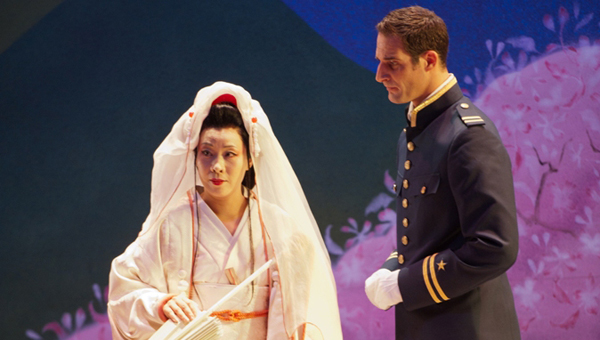Madam Butterfly 3D Review

They sure don’t make ’em like they used to.
Which, despite what my and no doubt countless other fathers may think, is actually a good thing.
Madam Butterfly begins with an egocentric American naval officer by the name of B F Pinkerton inspecting and then serenading his new Japanese abode and servants, arranged for him by a native broker in this foreign country.
It’s a 999 yr lease, with a monthly get out clause.
That’s not the only thing this native advisor has arranged for Pinkerton though, as no sooner has our great american hero greeted his new Nagasaki home than he’s enquiring about his matching Japanese bride to boot.
Now, that’s one thing an estate agent’s never offered me before to try and clinch a deal.
Cio-Cio-San is Lieutenant Pinkerton’s betrothed and, from the words she sings to describe him, is taking this marriage a whole lot more seriously than her American suitor who greedily confesses his love for having a girl in every port.
Only not in Cio-Cio-San’s earshot, naturally.
What will become of these two lovers from such disparate cultures, and who have such different ideas of love?
Madam Butterfly 3D is the classic opera brought to the silver screen by director Julian Napier and modern advancements in technology.
Which all sounded like a great idea to me, and I was more than a little excited at seeing some high brow entertainment through the relatively accessible medium of cinema.
Yet, despite some good music and even better singing, I guess some things really should be left to the mediums they were intended for.
Captured by 3D cameras at London’s Royal Opera House last year, you’ll work out the very basic premise and predictable outcome of Madam Butterfly within the first ten minutes.
The harsh truth is storytelling has evolved past its rudimentary narrative to the point where it now feels obsolete.
Of course, a musical is more than just a script and perhaps it’s here that something has truly got lost in translation.
The intimacy of a theatrical setting struggles to make itself felt in this medium, while the power and no doubt virtuoso voice of iconic soprano Liping Zhang as the eponymous character is similarly lost in a non live environment.
I guess there are some dimensions even modern technology has yet to successfully recreate for our entertainment, though it’s just as likely that this classic story is no longer suited to the modern age.
So as my dad is particularly fond of saying, they don’t make ’em like they used to.
And thank god for that.
Jonathan Campbell